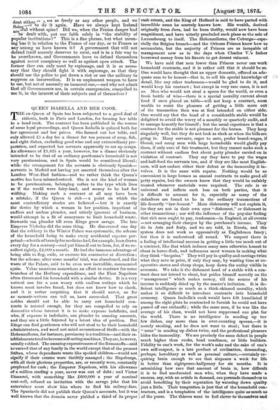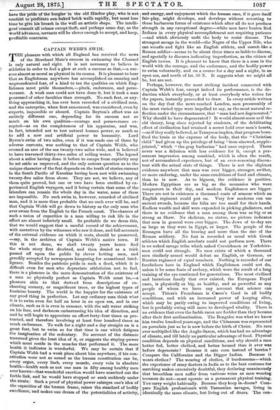QUEEN ISABELLA AND HER - COOK.
THEex-Queen of Spain has been subjected to a good-deal of ridicule, both in Paris and London, for farming her table to a -head took. The contract has been published in the course of some legal proceedings, and Queen Isabella is quizzed both for her agreement and her prices. She farmed out her table, and only allowed £5 a day for a dinner for ten persons of soup, fish, and eight dishes, excluding good wine and any extraordinary pre- paration, and expected her servants apparently to eat up scraps. Arc-allowance of £1,825 a year, however, for a dinner obviously intended to be that of an ordinary gentlenian's household is not very parsimonious, and in Spain would be considered liberal ; while the arrangement for the servants is obviously Spanish— servants in Madrid not having yet asserted themselves after the London West-End fashion—and we rather think the Queen's motive has 'been-Misunderstood. She is not the kind of woman to -be parsiinonions, belonging rather to the type which lives as -if the world were fairy-land, and money to be had for wiefing Making such a contract at all may have been a 'Mistake, if the Queen is rich —a point on which the most contradictory stories are believed —but it is exactly the device by 'which a woman in her position, impatient of endless and useless plunder, and utterly ignorant of business, would attempt in a fit of annoyance to limit household waste. Stewards can plunder till even Kings grow savage. The late Emperor Nicholas -did the same thing. He discovered one day that the robbery in the Winter Palace was systematic, the scheme of the household being to make every accidental expense per- petual—a bottle of brandy for medicine had, for example, been drawn every day for a century—and put himself out to farm, for, if we re- collect rightly, £2,000 a month. He had the immense advantage of being able to flog, exile, or execute his contractor at discretion ; but the scheme, -after some months' trial, was abandoned, and the waste of the Palace, said to be even now incredible, commenced again. Vehse mentions somewhere an effort to contract for some branches of the Hofburg expenditure, and the First Napoleon often threatened his household with a similar device. It is a very natural one for a man weary with endless outlays which he knows must involve fraud, but does not know how to check, and it is rather surprising that it should never, so far asp memoir-writers can tell us, have succeeded. That great nobles should not be able to carry out household con- tracts is natural enough, for they are compelled to rely on domestics whose interest it is to make expense indefinite, and who, if expense is indefinite, can plunder to amazing amounts, and they are a little fettered by a latent idea of position. But Kings can find gentlemen who will not steal to be their household administrators, and need not 'mind accusations of thrift—with the Hoheuxollerns, for instance, parsimony is a tradition—and their es- tablishments tend to become self-acting machines. Theyare, however, =tally robbed. The amazing expensiveness of the Romanoffs—said teeexeeed that of any family in the world except that of the present Staten, whose 'dependants waste like spoiled children—would not signify if their estates were thriftily managed ; the Hapsburgs, with all their glorioua properties, are, or recently were, constantly ptrplexed for cash ; the Emperor Napoleon, with his allowance of a million sterling a year, never was out of debt ; and Victor EMannel, with something ire £600,000 a year of nominal rent-roll, refused an invitation with the savage joke that his entertainer must alio* him where to find his railway-fare. The Spaniards did not publish their Queen's accounts, but it was well known that the domain never yielded a third of its proper cash return, and -the King of- Holland is said to have parted with incredible sums he scarcely knows how. His wealth, derived originally from Java, had he been thrifty, would now have been magnificent, and have utterly precluded such plans as the sale of Luxembourg to itself. The Hohenzollerns, the Coburgii—espe- cially the Belgian 'branch—and the Orleans Princes know how to accumulate; but the majority of Princes are as incapable of management now as in the days when Charles V.'s father borrowed money from his -fiancee to get decent raiment.
We have said that men lower than Princes never can work household contracts, and it is rather odd that it should be so. One would have thought that-an'upper 'domestic, offered an ade- quate sum to be honest—that is, to sell his special knowledge of detail, like any other tradesman—would be 'glad to do it; and would keep his contract; but except in- very rare cases, it is not so. Men who would not steal a spoon-for the world, or even a fresh bottle of wine—there is a special morality current about food if once placed on table—will not keep a contract, seats unable to resist the pleasure of getting a little more out of the transaction than was at 'first "intended on -either side. One would say that the head of a considerable stable would be delighted to avoid the worry of a monthly or quarterly audit, and to manage honestly for himself ; but the usual experience is that 'a contract for the stable is not pleasant for the horses. They keep singularly well, but they do not look as sleek as when the bills are going in. Many servants, eager to save, prefer board-wages, if liberal, and many men with large households would gladly pay them, if only sure of fair treatment, but they cannot make such a contract without endless fret about petty plunder carried on in violation of contract. They say they have to pay the wages and-half-feed the servants too, and if they are like most English= men, will not endure either their defeat or the immorality it in- volves. It is the same with repairs. Nothing would be so convenient in large houses as annual contracts to make good all petty repairs, but the owners know that they would be unfairly treated whenever materials were required. The rule is 'so universal and inflicts such loss on both parties, that it is difficult to account for it, especially as many of the defaulters are found to be in the ordinary transactions of life decently "law-honest." Mere dishonesty will not explain it, for they are not in their own 'eyes "dishonest," or dishonest in other transactions ; nor will the influence of the popular 'feeling that rich men ought to pay, tradesmen—in England, at all events —not arranging their charges by the purchaser's income. They do in Asia and Italy, and we are told, in Russia, and the system does not work so oppressively as Englishmen fancy; but then it is understood all round. We suspect there is a feeling of intellectual success in getting a little too Much out of a contract, like that which induces many men otherwise honest to cheat in horse-flesh, and influences most women in making what they think "bargains." They will pay in quality and carriage twice what they save in price, if only they may, by wasting time at co- operative stores and cheap shops, keep down the outlay visible in accounts. We take it the dishonest head of a stable with a con- tract does not intend to cheat, but prides himself secretly on the " management " which makes money, till the source of his income is suddenly dried up by the master's irritation. ft is de- ficient intelligence as much as a thick-skinned morality, which makes it so difficult to introduce contracts into household economy. Queen Isabella's cook would have felt humiliated if among the eight plats he contracted to furnish he could not have passed off one rechauffe ; while the same man, if he was like the average of his class, would not have suppressed one plat for the world. There is no intelligence' in sending up too few dishes, any more than in over-counting spoons, it is merely stealing, and he does not want to steal ; but there is " nous " in sending up dishes twice, and the professional pleasure hides the immorality. We see precisely the same defect in people much higher than cooks, head coachmen, or little builders. Fidelity to one's work, for the work's sake and the sake of one's own self-respect, is a late product of civilisation, demanding, perhaps, hereditary as well as personal culture,—certainly re- quiring brain enough to see that sixpence 'a week for life is better . than eightpence-halfpenny for six months. It is astonishing how rare that amount of brain is, how difficult it is to find uneducated men who, when they have made a success, say, with an article in demand, can persuade themselves to avoid benefiting by their reputation by watering down quality just a little. Their temptation is just that of the household con- tractors, and is a temptation of the intelligence quite as much as of the purse. The -thieves want to feel eleVer to themselves and have the-prkre of the burglar in the-old Hindoo play, who is-not content to perforate sun-baked brick walls rapidly, but must lose time to give his breach in the wall an artistic shape. The intelli- gent commit all crimes except theft, and perhaps some day, as the world advances, servants will be clever enough to accept, and keep, profitable contracts.































 Previous page
Previous page